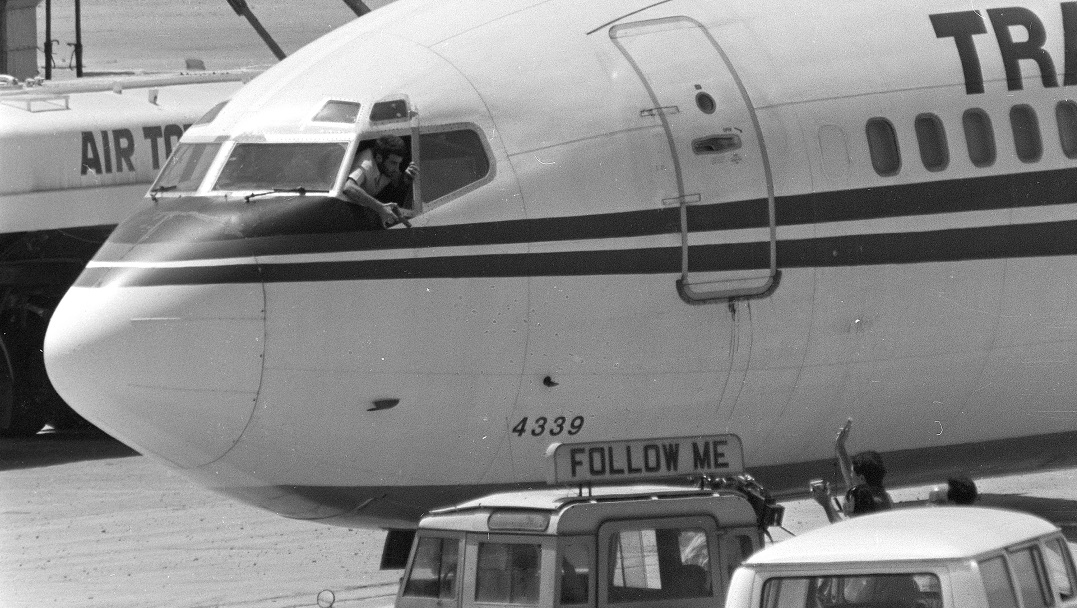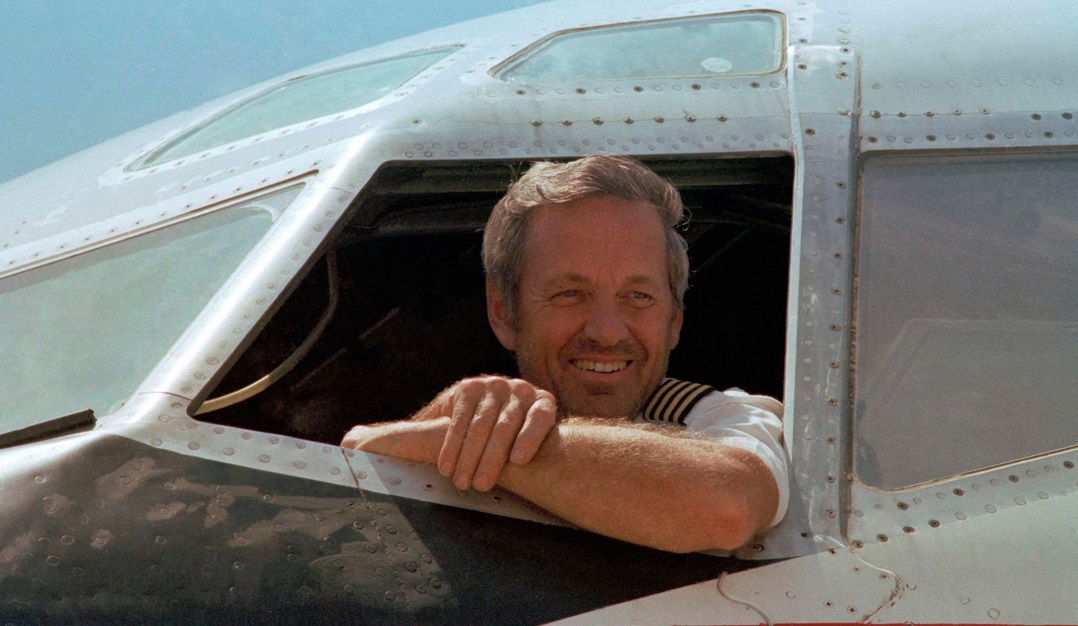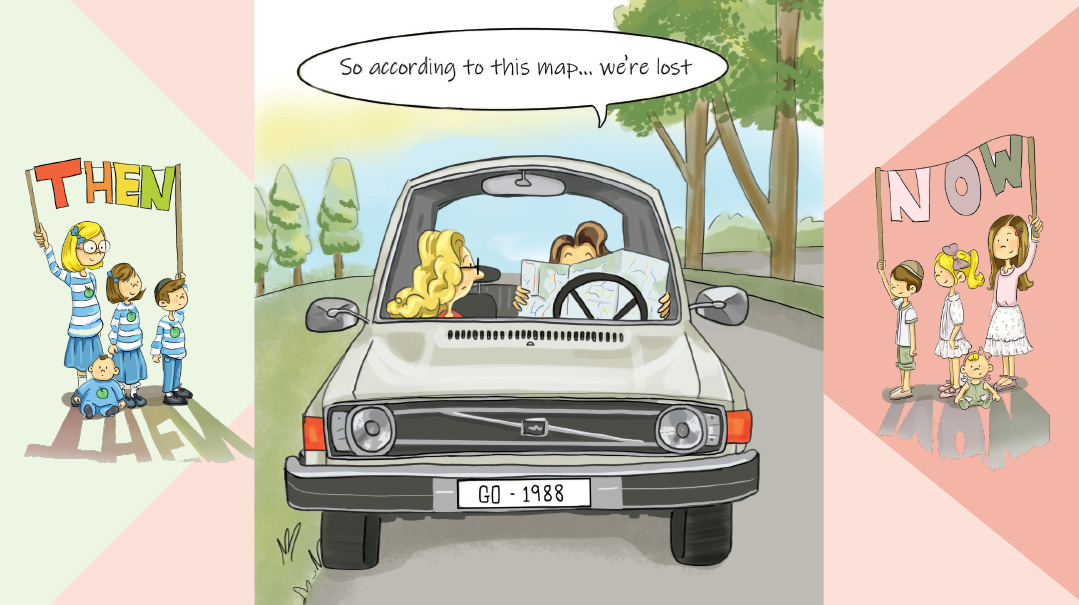Hijacked!

In the summer of 1985, Suzie Herzberg boarded a plane to fly home from her honeymoon. Minutes later, two armed terrorists took over the plane, shouting, “We come to die.”

(photo: AP)
A
thens International Airport Greece. A young man hastily approached the TWA ticket counter. His flight to New York had just been canceled and he was determined to get onto Flight 847 to Boston instead. The flight was about to leave and no matter how hard he pleaded the ticket agent was adamant — sorry but he could not board the plane. His desperation surely aroused the sympathy of onlookers. But all is not always as it seems: Ali Atwa’s inability to get on that flight may have determined the fate of 153 lives.
***
S
uzie and Richard Herzberg’s honeymoon on a Mediterranean cruise had been glorious: riding a donkey up to the summit of Santorini exploring the islands of Corfu and Rhodes taking in the Parthenon in Athens. As she settled into her first-class seat for the flight to Boston Suzie thought to herself Life must be good if I’m actually looking forward to ending my honeymoon and going back home.
As soon as the seatbelt sign went off Suzie reached down into her striped bag to retrieve her wedding list and thank you cards hoping to finish writing them on the long transatlantic flight. “I was rummaging through my bag when I heard a commotion. It sounded like glass breaking and I figured the stewardess must have dropped something ” says Suzie who was 27 at the time. “When I heard a woman scream I naively wondered if she had gotten cut by the glass I assumed had broken.”
Then Suzie looked up.
Two fierce-looking men obviously Arabs were frantically motioning with their guns for the first-class passengers to get out of their seats.
G-d please don’t let this be happening was Suzie’s first thought followed immediately by My ring! Inscribed on the band was the Hebrew phrase Ani l’Dodi v’Dodi Li.
“Getting this ring off my finger I knew was a matter of survival. But having been in a highly humid atmosphere for the past two weeks it just wouldn’t budge. With rising panic I struggled to get it off until finally by the grace of G-d I succeeded and hid it in my wallet. This misstep would haunt me for the rest of my 37-hour ordeal as I was in a constant state of terror that they would find the ring in my wallet and identify me as its Jewish owner.”
Then Suzie did something that she cannot explain and which she says was nothing less than G-d placing His Hands over hers and directing her movements. “I had two rings on my other ring finger. I took off the sapphire one and put it where the Ani l’Dodi ring had been. And then I immediately thought What did I do that for?”
The answer to that question would hit her like a bolt of lightning the next day.
***
U
nseen by Suzie in first class, the two hijackers had raced up from the back of the plane, spraying the cabin with a Mace-like substance as they ran. Each one held a grenade in his hand with one pin removed; once the second pin is removed, the grenade is ready to detonate.
Uli Derickson, whose sorry fate it was to be head stewardess on this flight, recounted in an interview with People magazine: “I was slammed against the cockpit door. Someone kicked me in my left chest with a karate kick … and then I felt the muzzle of a gun at my left temple. Two men. Very excited, sweating and shouting Arabic at me to open the door of the cockpit. Then I said, ‘I speak German.’ One of the hijackers, the one with the gun, then said in flawless German, ‘We come to die, open the door, we come to die.’”
The cockpit door was burst open, and the helpless flight crew, under extreme duress, heeded directions and turned the plane a steep 180 degrees. Destination: Beirut.
The hijackers turned their attention to those in first class next, ushering Suzie, Richard, and the ten other passengers out of their seats at gunpoint. “We were marched to the back of the plane with our hands above our heads, their guns trained on our backs,” Suzie recounts. “As I walked down the aisle, I saw identical expressions of fear, panic, and surprise on everyone’s faces, and it occurred to me that my face must look the same.
“You know the feeling you have when you’re afraid your car is about to crash?” says Suzie, describing how she felt. “That sick feeling where your stomach feels as if it’s coming up your throat, and you have this huge adrenaline rush? Multiply that by thousands and thousands and thousands.”
Once first class was cleared, the terrorists set up a base of operations there, complete with guns, axes, and knives. They were well trained: Within minutes of the takeover, passengers were instructed to assume the crash position: heads in laps, and hands behind heads. It was a position they were forced to maintain whenever the plane was on the ground, often for many hours at a time.
“Your entire body is in unbearable pain. My arms started to tremor after a while, and I was terrified of being tortured if I fell out of position,” Suzie recalls. “Believe me, you can do things you otherwise couldn’t when you’re afraid for your life. When they finally allowed us to lift our heads, once in flight again, I was physically unable to.” One of the hijackers kindly yanked her head up for her.
“Straight out of the hijacking manual, the two men rearranged passengers’ seats so that the stronger people were tucked away in the window seats to prevent trouble, and the weaker individuals were placed in the aisle seats. I was dragged from the galley, where they had temporarily taken the first-class passengers, and shoved into a seat in the third row. One of the hijackers hit the back of my neck with his gun, but I refused to give him the satisfaction of screaming.” Richard was left in the back of the plane, and the two newlyweds didn’t see each other again until the nightmare ended.
“Everything happened so quickly,” says Suzie. “The first time I really had a chance to think was when I was forced into my new seat. And then the thoughts came fast and furious.” Suzie pauses. When she finally speaks again, she chooses every word carefully.
“You see, I grew up in a religious home, but I decided to test the waters in college, and I had been living a secular lifestyle. But in those first minutes sitting in that seat on that hijacked plane, it was suddenly crystal clear to me: G-d runs the world. There was an intensely heightened awareness of His Presence right there beside me.
“Then I started to cry. I regretted all the lost time, the lost opportunities for living my life the way it was meant to be lived. I felt sorry that my parents would never know that I realized the mistakes I had made. I was overcome with the sense that Hashem must have sent me messages before, less severe ones, so that I’d open my eyes. But I had ignored them.” Like leaves caught up in a windstorm, these thoughts swirled and churned, whipping and spinning across her consciousness with wild abandon.
“Then I did teshuvah,” Suzie remembers. “A calmness settled over me and I was really okay with the thought of dying.”
***
S
hortly after the takeover, Uli’s voice was heard over the microphone: “Our friends from Beirut want us to cooperate.” The stewardess had been forced into the role of liaison between the hijackers and passengers, and her calm, soothing manner is widely considered to have saved lives. She sang lullabies to the terrorists on demand, respectfully listened to their religious harangues, and did her best to keep their tempers from flaring.
In that initial announcement, the passengers got their first clue as to the identity of the terrorists. They later learned that the hijacking was carried out by a militant Shiite group based in Lebanon that was little known at the time — Hizbullah —with instrumental support from Iran. The hijackers referred to themselves as “Castro” and “Said” in order to keep their identities hidden. Their real names were Mohammed Ali Hammadi and Hassan Izz-Al-Din. The third hijacker never made it on the plane — Ali Atwa had been detained at the airport in Athens.
A few moments later, Castro boomed over the microphone, “Who here is Israeli?” Of course he meant Jewish as well. “As if we were supposed to raise our hands and say, ‘come kill me,’" Suzie says dryly. Until that point, Suzie thought she had already reached maximum panic level; hearing those words, her terror multiplied exponentially. Yet even as she feared for her life, her heart went out to the other Jews on the plane, all secular, who, she believed, would die for being Jews without having had the opportunity to live as Jews.
Despite her precarious situation, with a very Jewish-sounding last name and incriminating evidence in her possession, Suzie’s identity remained a secret. Still in awe so many years later, Suzie relays how “Yad Hashem occurrences” kept unfolding, one after the next, each one a literal life preserver in a sea of madness:
“A short while into the hijacking, Uli was ordered to collect everyone’s passports. Tucked into my passport was my brand-new marriage license. When Uli saw it sticking out of my passport, she took a closer look and, noticing the rabbi’s name on it, immediately realized it belonged to a Jew. At great personal risk, she hid my passport, which happened to contain multiple Israeli stamps. If not for the marriage license, she would have never noticed the Israeli stamps and my passport would have landed in the hijackers’ hands. My story would have ended in disaster –– it was clearly Yad Hashem. Still, since I had no idea Uli hid my passport, I was in a state of panic the whole time, certain that I would be exposed at any minute.
“The entire time on the plane, the hijackers were constantly rifling through everyone’s personal possessions. After already having endured 16 hours of agony, my worst fears were realized — those two animals with guns found the Ani l’Dodi ring. In an effort to sniff out Jewish blood, they inspected everyone’s hands by flashlight in search of a tan mark indicating the missing ring. As they approached me to examine my fingers, I truly thought I was going to die and I said my final Shema.”
But the sapphire ring perfectly covered her tan mark. This baffling act, inexplicable at the time, had without a doubt saved her life. Yad Hashem.
“Had the hijackers themselves collected the passports instead of Uli, I would have been a dead woman. Yad Hashem.
“My striped bag was used to collect the passports in. My guest list and thank you cards, which included the names of many rabbis, were still in the bag when the hijackers seized it. How they never noticed them while examining all the passports in the very same bag is nothing short of miraculous.”
When Suzie removed her Ani l’Dodi ring, she placed it in the closed change purse in her wallet. When the ring was found by the hijackers, how did it not occur to them to identify its owner by looking in the wallet in which it was found?
“We had to go up to the hijackers one by one, remove our jewelry, and hand it to them. I had no doubt that when I’d remove my sapphire ring they’d see the tan mark and identify me as the owner of the Ani l’Dodi ring. I was nauseous with fear. Yet the hijackers were completely oblivious as they stared at what they had been so urgently searching for just a few hours earlier. Yad Hashem.
“As I witnessed each of these events, it became so clear to me that Hashem orchestrates every single thing that happens, every minute of every day. In the natural order of things, I should have died on that plane, yet my life was spared many times over.”
Upon landing in Beirut, the hijackers broadcast their demand to the world over the aircraft’s radio: The release of “Kuwait 17,” a group of 17 radical Shiite Islamists imprisoned in Kuwait for their involvement in the 1983 bombing of the US embassy there. When it was clear to them that Kuwait would not budge, they demanded instead the release of all 766 prisoners, mostly Shiite Lebanese, being held in Israel for committing terrorist acts against Israeli soldiers in Southern Lebanon.
Over the course of three days, the hijackers led the plane in a bizarre repetitive circuit from Beirut to Algiers to Beirut to Algiers to Beirut. At each stop, a number of passengers, chosen seemingly at random, were released. Whenever the plane was grounded, everyone quickly learned, it was time to brace oneself for random acts of torture. One never knew if he was up next to have his head smashed by a gun, a cigarette extinguished on his skin, or a partially loaded gun placed on his temple and the trigger pulled in a macabre game of Russian Roulette.
“I could often hear random slaps followed by screams. Outrageous as it sounds, the terrorists took regular prayer breaks amid their torture sessions, always careful to face east.”
The mind games the hijackers played served their purpose, escalating the passengers’ fear and tension to an unbearable level.
“Conditions on the plane were abhorrent,” Suzie continues. “Any time we were on the ground, there was no air flow, and it was unbelievably stifling. Sweat was pouring off people, and everyone’s clothing was sticking to them. Sweat was dripping into my eyes but I couldn’t wipe them for fear of leaving the crash position. The stench on the plane was overpowering. For the first approximately 18 hours, we weren’t allowed to use the bathrooms. Eventually they allowed us this privilege, but only with the pleasure of an open door and a gun pointed at us.
“The hijackers passed out food and bottles of water, but I refused to take anything from them. Nothing passed my lips, other than prayers, for the entire 37 hours I was on the plane. I was hit and threatened that I wouldn’t make it off alive because I wouldn’t take an orange. The hijackers were, absurdly enough, very concerned about their reputation. One of them said to me at gunpoint, ‘Tell people we were nice. We were nice, right?’ I watched passengers fall prey to the Stockholm Syndrome, thanking the hijackers for giving them a sip of water. When we were released, I actually heard other passengers saying, ‘They were nice. They gave us food and water.’
“The entire time on the plane I never experienced hunger or thirst. My only thoughts were on what’s important in life. This is what Yom Kippur is supposed to be like. It’s upsetting to me that even on Yom Kippur, I’m unable to reproduce the feelings of closeness to G-d and the clarity that I had on that plane.”
In a scene that would have been comical had it not been so desperate, the ground crew at the Algiers airport refused to refuel the plane without getting paid. In a fit of fury, the hijackers threatened to kill one passenger every five minutes until they received fuel. Related Uli, “The copilot was bright red in the face, screaming his lungs out to the ground [crew] not to be so stupid, we don’t carry a [credit] card.” Trying frantically to defuse the crisis, Uli ran to the cabin asking passengers if anyone had a credit card. It suddenly occurred to her that she had one in her purse, and 6,000 gallons of jet fuel were placed on her credit card, crisis (temporarily) averted.

Captain of hijacked TWA jet John L. Testrake talks to reporters from the plane cockpit in Beirut, Lebanon (photo: AP)
The hijackers’ thirst for sowing fear and panic had not yet been satiated. They separated a group of six or seven men they believed had Jewish-sounding names. It is evident that the curriculum in hijacking school did not include onomastics (the study of the origin of names): Suzie’s husband Richard Herzberg was the only Jew among the group. These men spent the next two and a half weeks being shuffled between basements of bombed-out buildings in Beirut, with no idea if, how, or when it would all end.
Of all the horror Suzie had to endure, the Robert Stethem affair was one of the most excruciating. Among the collected passports were a handful of green military ones. What a find! Stethem was called up, and he told the hijackers he was in the US Navy (he was a Navy SEAL). “As a single guy, I believe Robert was presenting himself as a sacrificial lamb — most of the other Navy SEALs were family men,” Suzie says.
Stethem was immediately blindfolded, and his arms were tied very high behind his back with an elastic cord. Over the course of many hours, Stethem was repeatedly dragged to first class and tortured. Uli recounts, “They put the mike up to his face so his screams could be heard by the outside world.” In the third row, Suzie’s panic reached unprecedented levels. “I would wince each time he screamed, and I kept thinking that I just don’t want to be tortured. This was the second time on the plane that I said my final Shema, sure I was going to die. The third was when we prepared for a crash landing in Beirut because the airport was barricaded.”
In 1995, a Navy warship was named for Robert Stethem, who didn’t make it off the plane alive. Suzie, as the sole passenger who called Robert’s parents to express condolences after the ordeal was over, was invited to the naming ceremony.
Stethem was, in fact, only one of a number of people who were singled out for severe torture on the plane. Says Suzie, “My overriding fear, the entire time, was of being tortured. When we were told to prepare for a crash landing, I embraced the idea of a quick death. When we landed normally at the last second, I was actually — odd as this sounds — disappointed. My fear of being tortured was greater than my fear of death.”
Suzie was released on Saturday night, June 15, during the second landing in Algiers, after experiencing the 37 most excruciating hours of her life. The freed group was flown to Paris and greeted by State Department officials, who debriefed them. “My father came to meet me in Paris and the first thing we did was go to shul to bentsch gomel.”
They waited in Paris with great trepidation for news about Richard, but with none forthcoming, they returned home after a week. On June 30, the remaining 30-odd passengers, Richard included, were finally freed in Beirut. This last group had been held hostage an astounding 17 days.
It had been a veritable eternity for loved ones like Suzie waiting at home with nerves stretched to the breaking point. Over the course of the hijacking, Israel had quietly released small numbers of Lebanese prisoners at a time. When the prisoners were all freed, the crisis was over.
***
I
n 1988, while listening to the news one day, Suzie’s jaw suddenly went slack and her heart started hammering violently: Hammadi (Castro) had been caught by airport authorities in Frankfurt transporting liquid explosives. A short while later, Suzie was contacted by the FBI. They were looking for witnesses to testify against him, and her debriefing stood out. Escorted by two FBI agents, Suzie traveled to Frankfurt and testified for three days just feet away from an impassive Castro, the man who indelibly altered her life in such negative — yet also positive — ways.
The Stethems sat through the entire six months of testimony in an effort to piece together the last hours of their heroic fallen son. Hammadi was given a life sentence, but to Suzie’s horror, he was released in 2006 in, she suspects, an under-the-radar swap for a Western journalist being held in Iraq. There have been foiled attempts to capture Said; the $5 million reward for information leading to his arrest and conviction still stands today. The mastermind behind the hijacking, Imad Mugniyah, was killed by Israeli operatives in Syria in 2008.
After the hijacking ended, the experience still wasn’t over for Suzie. “For a long time, everyday noises would bring on a panic. We lived in Norfolk, Virginia, at the time, and the noise and constant motion in the city was just too much for me, so we moved to the suburbs. Until today, a sound, sight, or even a smell can transport me back to that plane in an instant, but with effort I am able to push it out of my consciousness. I still dread traveling by plane, not because I’m afraid it will happen again, but because the setting brings it all back to me with such startling vividness.”
It is remarkable how the events of a mere day and a half can elicit such profound, lifelong changes in a person. “I became frum when I walked off that plane. There was such piercing clarity that there was no alternative. Hashem granted me heightened awareness of His Presence from the first moments until the very end, and that which I experienced on the plane has stayed with me, although obviously not with the same intensity.”
By facing death, Suzie was able to witness Hashem granting her life. “I realized, with absolute certainty, that I am here for a reason. I was able to raise three sincerely frum children. Hopefully my future generations will all live to do Hashem’s Will, too.” She was not the only one to undergo a spiritual transformation. “I was told that the plane’s captain also became religious after the hijacking.”
Even in life’s most mundane moments, Suzie continues to see Hashem’s guiding Hand. “When a small ball recently bounced across the length of the Yom Tov table without knocking anything over or landing in anyone’s soup, I saw it as a clear sign of Yad Hashem,” she laughs. “I also utilize my experience as a strengthening tool. When dealing with a challenge, I think to myself, If I was able to endure what I did, then I can certainly deal with this. The hijacking helped me define who I am. And not a single day goes by that I don’t express my gratitude to Hashem for saving me.”
Richard, in contrast, maintained his secular lifestyle. This engendered unique challenges for Suzie as she raised her two sons and one daughter as Torah Jews, yet her commitment was rock-solid and she never wavered. Today their three grown children are serious ovdei Hashem, with a clarity of purpose that belies their ages.
“They’ve all independently told me that they sense their lives are the purpose of my survival,” shares Suzie. “They’re awed by the obligation they feel to live life the way Hashem wants them to.” They certainly have whom to emulate.
(Originally featured in Family First Issue 304)
Oops! We could not locate your form.












